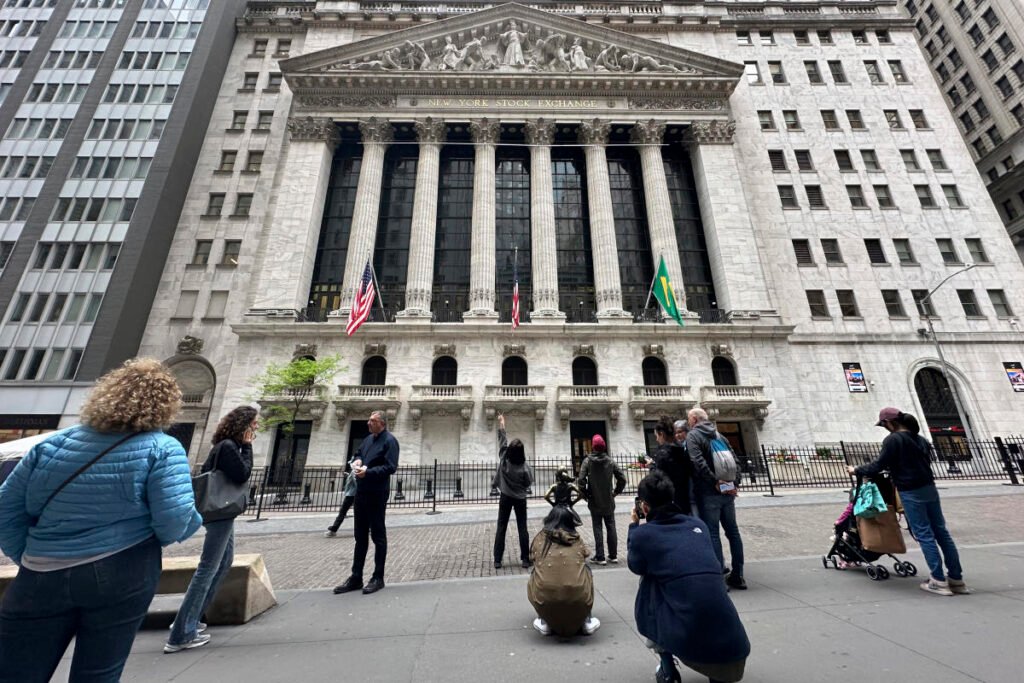NEW YORK (AP) — U.S. stocks were mostly higher on Friday, recovering from Wall Street’s worst day since April.
The S&P 500 was up 0.7% in afternoon trading, erasing this week’s losses and snapping a fifth straight weekly gain. The Dow Jones Industrial Average was up 83 points, or 0.2%, as of 12:39 p.m. Eastern time, and the Nasdaq Composite was up 1%.
Deckers Outdoors Inc. rose 13.6% for the market’s biggest gain after reporting better-than-expected profits and revenues for its latest quarter. The company, which owns the Hoka, Ugg and Teva brands, also gave earnings guidance for the next fiscal year that was in line with analysts’ expectations.
Ross Stores also led the market with a 9.9% surge after reporting profits for its latest quarter that beat analysts’ expectations. The increase came even as revenue only slightly beat expectations as customers continue to cut back on non-essential purchases.
“Several challenges, including persistent inflation, continue to weigh on the purchasing power of our low- to moderate-income customers,” CEO Barbara Rentler said in a statement.
While overall, or macroeconomic, data points to continued strength in U.S. household spending, the numbers below the surface may not be so encouraging.
“Walmart and Target are saying that higher-income consumers are doing well, but they’re starting to shop less,” said Brian Jacobsen, chief economist at Annex Wealth Management. “Lower-income consumers are struggling. Macroeconomics is often too focused on averages, and the averages are skewed by higher-income households.”
On Friday, markets rose slightly on a report that overall sentiment among U.S. consumers in May was not as weak as preliminary data had suggested. Perhaps more importantly, the University of Michigan report also said that U.S. consumers’ inflation expectations for the year ahead did not rise as much in May as initially feared.
U.S. stocks are retreating from recent record highs amid concerns that inflation is struggling to pick up. The decline began after the Federal Reserve released minutes from its last policy meeting on Wednesday, which showed some officials talking about potentially raising interest rates if inflation worsens.
Stocks fell further after reports on Thursday showed the U.S. economy performing better than expected. Such strength could actually spook Wall Street, as it could keep inflationary pressures up. That could at least prompt the Federal Reserve to delay lowering its key interest rate to reassure financial markets. The Federal Reserve has been cutting its key interest rate, which is at its highest in more than 20 years.
Goldman Sachs economist David Mericle pushed back his forecast for the Fed’s first interest rate cut from July to September, following Thursday’s reports on U.S. business activity and the unemployment rate.
Those concerns have sent Treasury yields higher this week but were mixed on Friday following the report on consumer sentiment. The 10-year Treasury yield fell to 4.47% from 4.48% late Thursday. The 2-year Treasury yield, which better reflects expectations of Fed action, rose to 4.95% from 4.94%.
The stock market’s volatility this week came despite a stunning new profit report from Nvidia, which has skyrocketed to become one of Wall Street’s most powerful stocks thanks to the frenzy around artificial intelligence technology. While the frenzy around AI has driven some stocks to heights that critics say are overdone, Nvidia’s phenomenal growth and forecasts of even more growth suggest the company could continue to gain momentum.
Workday shares fell 13.9% on Wall Street on Friday, despite the company reporting profits for its latest quarter that beat analysts’ expectations. The company, which helps businesses manage their talent and finances, also gave a forecast for future subscription revenue that was slightly below Wall Street expectations.
Overseas stock indexes in many Asian and European countries fell, with Hong Kong down 1.4%, Seoul down 1.3% and Tokyo down 1.2%.
___
AP Business Writers Matt Ott and Elaine Kurtenbach contributed.

